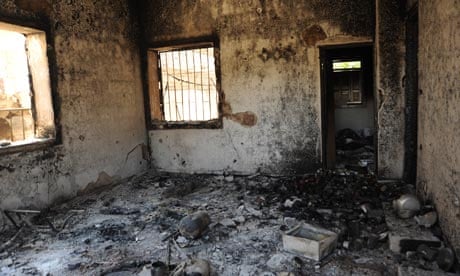The US's top military officer has warned Syria it could face armed intervention as international outrage grows over the massacre of women and children by tanks and artillery in Houla.
General Martin Dempsey, the chairman of the joint chiefs of staff, said that following the UN security council's condemnation of the slaughter – in which more than 100 people were killed, many of them children – there needed to be increased diplomatic pressure on Damascus. But he added that the US would be prepared to act militarily if it was "asked to do so".
"There is always a military option," he told Fox News. "You'll always find military leaders to be somewhat cautious about the use of force, because we're never entirely sure what comes out on the other side. But that said, it may come to a point with Syria because of the atrocities."
The warning comes as Barack Obama is under increasing pressure from his Republican opponent in November's presidential election, Mitt Romney, and members of Congress to take tougher action over Syria.
Romney accused Obama of weakness and disparaged his support for efforts by the former UN secretary general, Kofi Annan, to revive a failing peace plan. He said Washington should instead arm opposition groups.
"After nearly a year and a half of slaughter, it is far past time for the United States to begin to lead and put an end to the Assad regime. President Obama can no longer ignore calls from congressional leaders in both parties to take more assertive steps," he said.
Romney continued: "The Annan 'peace' plan, which President Obama still supports, has merely granted the Assad regime more time to execute its military onslaught. The United States should work with partners to organise and arm Syrian opposition groups so they can defend themselves. The bloodshed in Houla makes clear that our goal must be a new Syrian government."
Senator John McCain, the Republican presidential candidate against Obama four years ago, called the White House "feckless" for not doing more to stop Syria.
"This is a shameful episode in American history," he said. "It's really an abdication of everything that America stands for and believes in."
Dempsey was asked if there is a place in Syria for the Libya model, in which Nato led a bombing campaign ostensibly to protect civilian areas but which swiftly evolved into action directly in support of the rebels.
"I'm sure there are some things that we did in Libya that could be applicable in a Syria environment or Syria scenario. But I'm very cautious about templates," he said.
Obama has steered clear of public discussion about military action against the Assad regime, saying that conditions in Syria are different from those in Libya. For a start, Russia is a major diplomatic obstacle to military action or even much stronger sanctions although it backed the UN security council condemnation of Damascus on Sunday, suggesting there are limits to the protection it is prepared to offer.
Neither is there much appetite for military intervention in other western capitals, including France which led the assault on Libya but which has since had a change of leadership with the election of Francois Hollande.
Domestic US political conditions have also shifted since the Libya campaign. With an election in November, the president may not want to embroil US forces in another Middle East conflict when he is trumpeting getting the US out of unpopular wars in Iraq and Afghanistan.
Washington is instead looking to a negotiated transition that would see President Bashar al-Assad surrender power as part of a power sharing agreement between the rebels and the regime.
The Russian foreign minister, Sergey Lavrov, on Monday said that Russia is not wedded to keeping Assad in control.
"It is not the most important thing who is in power in Syria, what regime has power," he said. "For us, the main thing is to put an end to the violence among civilians and to provide for political dialogue under which the Syrians themselves decide on the sovereignty of their country."
